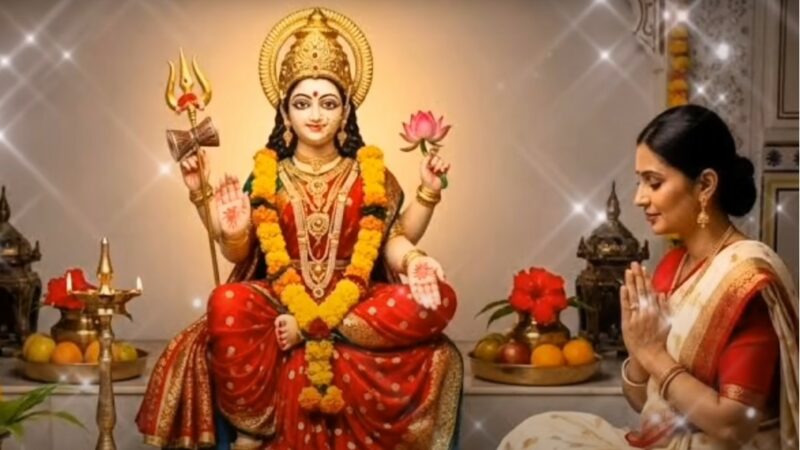
marks the eighth day of Sharadiya Navratri, dedicated to Maa Mahagauri, the epitome of purity, peace, and divine grace. This auspicious day, known as Durga Ashtami or Maha Ashtami, holds immense spiritual significance as devotees across India worship the eighth manifestation of Goddess Durga, seeking her blessings for purification of the soul and inner peace.
Understanding Maa Mahagauri: The Goddess of Purity
Maa Mahagauri represents the most compassionate and serene form of Goddess Durga. Her name derives from “Maha” meaning great and “Gauri” meaning fair or white, symbolizing her extremely radiant and pure appearance. She is depicted with a dazzling white complexion, wearing white garments, and riding a white bull (Vrishabha), all representing absolute purity and peace.
Divine Iconography:
Four arms with distinct symbolic elements
Right hand (upper): Abhaya Mudra (gesture of fearlessness)
Right hand (lower): Trident (Trishul) for destroying negativity
Left hand (upper): Damaru (small drum) representing life’s rhythm
Left hand (lower): Varada Mudra (boon-granting gesture)
The Sacred Legend of Maa Mahagauri
The Transformation Story
According to ancient Hindu scriptures, Maa Mahagauri’s origin lies in the intense penance performed by Goddess Parvati to win Lord Shiva as her consort. For years, she undertook severe austerities in forests, facing harsh weather conditions, fasting, and meditating with unwavering devotion.
During this prolonged tapas, her complexion became darkened by dust and hardship. However, pleased with her dedication, Lord Shiva appeared before her and agreed to marry her. To restore her original beauty, he bathed her in the sacred waters of Ganga, transforming her into the radiant, white-complexioned Mahagauri.
This transformation symbolizes the spiritual journey where sincere devotion and perseverance purify the soul, removing all karmic impurities and leading to divine realization.
Auspicious Timing and Muhurat for September 30, 2025
Tithi Details:
Ashtami Tithi begins: September 29 at 4:32 PM
Ashtami Tithi ends: September 30 at 4:31 PM
Main worship day: Tuesday, September 30, 2025 (based on Udaya Tithi)
Sacred Muhurat Timings:
Brahma Muhurat: 4:37 AM to 5:25 AM (ideal for early morning rituals)
Abhijit Muhurat: 11:47 AM to 12:35 PM (most auspicious for main puja)
Kanya Pujan Muhurat: 10:40 AM to 12:10 PM (for worshipping young girls)
Special Worship Duration: The main puja should be performed between sunrise to 1:54 PM for maximum spiritual benefits.
Complete Puja Vidhi (Worship Procedure)
Preparation Phase:
Early Morning Bath: Rise before dawn and take a purifying bath
Clean Attire: Wear fresh, preferably white or light-colored clothes
Sacred Space: Clean the worship area thoroughly and sprinkle Gangajal (holy water)
Altar Setup: Place Maa Mahagauri’s idol or picture on a wooden platform covered with white cloth
Main Worship Ritual:
Invocation: Light a diya (oil lamp) and incense sticks
Abhishekam: Perform ceremonial bathing of the deity with Gangajal
Offerings: Present white flowers, kumkum, akshat (rice), red sandalwood, and white chunari
Special Bhog: Offer coconut, kheer, halwa, fruits, and milk-based sweets
Mantra Chanting: Recite specific mantras dedicated to Maa Mahagauri
Sacred Texts: Read passages from Durga Saptashati or Durga Chalisa
Aarti: Conclude with the traditional aarti ceremony
Sacred Mantras for Maa Mahagauri
Primary Mantra:
“ॐ देवी महागौर्यै नमः॥”
(Om Devi Mahagauryai Namah)
Prayer Mantra:
“श्वेते वृषे समारूढा श्वेताम्बराधरा शुचिः।
महागौरी शुभं दद्यान्महादेव प्रमोददा॥”
Stuti Mantra:
“या देवी सर्वभूतेषु मां गौरी रूपेण संस्थिता।
नमस्तस्यै नमस्तस्यै नमस्तस्यै नमो नमः॥”
Vandana Mantra:
“वन्दे वाञ्छितलाभाय चन्द्रार्धकृतशेखराम्।
वरदाभयदात्रीं च महागौरीं नमोऽस्तु ते॥”
Special Bhog (Sacred Offerings)
Traditional Offerings for Maa Mahagauri:
Primary Bhog: Fresh coconut (considered most auspicious)
Sweet Dishes: Kheer (rice pudding), halwa (semolina-based sweet), rasagulla, peda
Fruits: White or light-colored fruits, especially coconut
Dairy Products: Fresh milk, mishri (rock sugar), white sweets
Special Items: White flowers, particularly jasmine and lotus
Prohibited Items: Avoid offering any red or dark-colored foods as they contradict the purity symbolism of Maa Mahagauri.
Kanya Pujan: The Sacred Tradition
Kumari Puja Significance
One of the most important rituals of Durga Ashtami is Kanya Pujan or Kumari Puja, where young girls (typically aged 2-10) are worshipped as living embodiments of the nine forms of Goddess Durga.
Kanya Pujan Procedure:
Invitation: Invite 9 young girls to your home
Welcome Ritual: Wash their feet with clean water
Sacred Thread: Tie sacred thread (kalava) on their wrists
Tilaka: Apply kumkum tilaka on their foreheads
Food Offering: Serve traditional meal of poori, chana (chickpeas), and halwa
Gifts: Present small gifts like bangles, notebooks, toys, or money
Blessings: Seek their blessings as they represent divine energy
Sandhi Puja: The Sacred Transition
Special Ritual at Ashtami-Navami Junction
Sandhi Puja is performed at the exact transition moment between Ashtami and Navami, commemorating when Goddess Durga killed the demons Chanda and Munda. This ritual involves:
108 oil lamps arranged in a specific pattern
Red flowers and special mantras
Continuous chanting during the transition period
Offerings of red-colored items symbolizing victory over evil
Astrological Significance and Benefits
Planetary Association
Maa Mahagauri is associated with planet Rahu, and her worship is believed to reduce the malefic effects of Rahu in one’s horoscope, bringing stability and peace.
Spiritual Benefits:
Karmic Purification: Absolves past sins and negative karmas
Mental Peace: Brings calmness and emotional stability
Health Improvement: Promotes physical and mental well-being
Obstacle Removal: Eliminates barriers in personal and professional life
Prosperity: Attracts abundance and material success
Spiritual Growth: Accelerates progress on the spiritual path
Color Significance: Peacock Green
Today’s Auspicious Color
The color associated with Durga Ashtami 2025 is Peacock Green, representing:
Energy and vitality
Prosperity and growth
Good fortune and success
Natural harmony and balance
Devotees are encouraged to wear peacock green attire during the puja to align with the day’s spiritual vibrations.
Sacred Aarti for Maa Mahagauri
Complete Aarti Text:
**”जय अम्बे गौरी, मैया जय श्यामा गौरी।
तुमको निशदिन ध्यावत, हरि ब्रह्मा शिवरी॥
मांग सिंदूर विराजत, टीको मृगमद को।
उज्ज्वल से दो नैना, चंद्रवदन नीको॥
कंठ में बागंबरि माला, करन फूल झुमका।
कमर में कासी कला, गोरे गोरे लांगडा॥”**
This traditional aarti should be sung with devotion while waving the oil lamp in circular motions before the deity.
Historical and Cultural Context
Festival Evolution
Durga Ashtami has been celebrated for thousands of years, with references found in ancient texts like the Devi Mahatmya and Markandeya Purana. The day commemorates the fierce battle between Goddess Durga and demon Mahishasura’s forces, where she destroyed many of his powerful warriors.
Regional Variations:
West Bengal: Grand celebrations with elaborate pandals and cultural programs
North India: Focus on Kanya Pujan and home-based worship
South India: Temple ceremonies with traditional music and dance
Gujarat: Integration with Navratri dance celebrations
Modern Relevance and Social Impact
Contemporary Significance
In today’s context, Maa Mahagauri worship offers several meaningful lessons:
Personal Development:
Stress Management: Her serene energy helps combat modern life’s anxieties
Forgiveness Practice: Teaches the importance of letting go of grudges
Purity of Intent: Encourages ethical living and honest conduct
Inner Peace: Provides tools for meditation and spiritual practices
Social Values:
Women Empowerment: Kanya Pujan promotes respect for feminine energy
Community Bonding: Collective celebrations strengthen social ties
Cultural Preservation: Maintains ancient traditions in modern times
Charity and Service: Encourages helping the less fortunate
Health and Dietary Considerations
Fasting Guidelines
Many devotees observe Navratri fasting which concludes on Ashtami. The traditional fast includes:
Permitted Foods: Fruits, milk products, specific grains like amaranth and buckwheat
Avoided Items: Regular grains, onions, garlic, non-vegetarian food, alcohol
Breaking the Fast: Should be done gradually with light foods after the evening aarti
Precautions and Important Notes
Worship Guidelines:
Avoid inauspicious timing: Do not perform puja during Rahu Kaal (usually 2:30 PM – 4:00 PM on Tuesdays)
Maintain cleanliness: Ensure all offerings and worship items are fresh and pure
Respectful conduct: Maintain devotional attitude throughout the ceremony
Safety measures: Be careful with oil lamps and incense to prevent accidents
Environmental Consciousness
Eco-Friendly Celebrations
Modern devotees are encouraged to:
Use natural decorations instead of plastic items
Opt for biodegradable offerings and flowers
Minimize noise pollution during celebrations
Practice water conservation during ritual bathing
Choose sustainable materials for worship accessories
Durga Ashtami 2025 represents a pivotal moment in the Navratri journey, where devotees experience the transformative power of divine grace. Maa Mahagauri’s worship on this sacred day offers an opportunity for complete spiritual purification and renewal.
As we prepare to welcome the final day of Navratri tomorrow with Maa Siddhidatri, today’s worship of Maa Mahagauri serves as the essential cleansing that prepares the soul for ultimate divine realization. Her blessings of purity, peace, and compassion create the perfect foundation for spiritual growth and worldly success.
The ancient tradition of Kanya Pujan reminds us to honor the divine feminine in all its forms, while the sacred rituals and mantras connect us to centuries of devotional practice. In our modern world, Maa Mahagauri’s message of forgiveness, purity, and inner peace remains as relevant as ever, offering guidance for personal transformation and social harmony.
May this Durga Ashtami bring divine blessings, spiritual purification, and lasting peace to all devotees who worship with sincere hearts and unwavering faith. “मां महागौरी की जय!”


